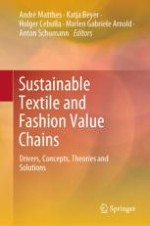2021 | OriginalPaper | Buchkapitel
5. Buying Practices in the Textile and Fashion Industry: Past, Present and Future
verfasst von : Lisa Koep, Jonathan Morris, Nina Dembski, Edeltraud Guenther
Erschienen in: Sustainable Textile and Fashion Value Chains
Aktivieren Sie unsere intelligente Suche, um passende Fachinhalte oder Patente zu finden.
Wählen Sie Textabschnitte aus um mit Künstlicher Intelligenz passenden Patente zu finden. powered by
Markieren Sie Textabschnitte, um KI-gestützt weitere passende Inhalte zu finden. powered by
